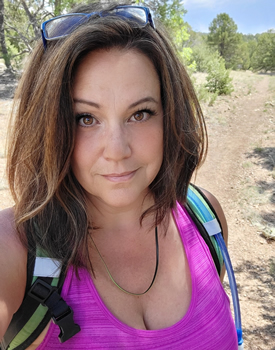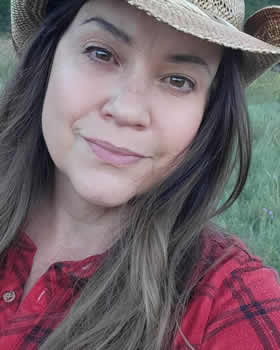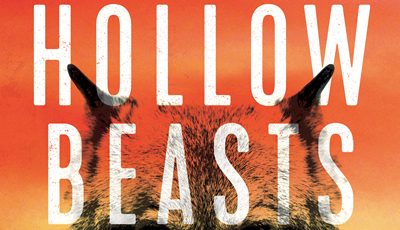

Features On the Cover: Alisa Lynn Valdés
Protecting Wild Things and Places
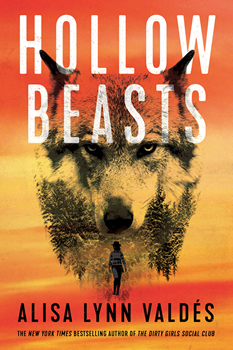 By Dawn Ius
By Dawn Ius
Alisa Lynn Valdés is a New York Times and USA Today bestselling author with more than 1 million books in print. Her latest release HOLLOW BEASTS will be her 14th novel, the story of a rookie game warden who must learn quickly on the job when she takes on a terrorist group in New Mexico.
Jodi—much like the author—is no stranger to the wilderness, and she’s determined to protect her homeland. But in this rugged landscape, Jodi uncovers much more than poachers—including a white supremacist group deep in the mountains where women of color are being held captive.
The prose is tight, expertly weaving us through the dangerous landscape in a cat-and-mouse game that will leave you gasping for breath. Valdés makes it look easy—and certainly, her success is well earned. But while writing has always been in the foreground, her path to fiction took on a few twists and turns of its own.
In this interview with The Big Thrill, Valdés talks more about that, and shares insight into what she hopes readers take away from HOLLOW BEASTS, and why it’s the right book to kick off a series.
I definitely want to talk about HOLLOW BEASTS, which is excellent, but in reading your bio, I was struck by how many different pursuits you have, as well as “former” careers—and congrats on mastering fly fishing. Try as I might, I can’t seem to cast properly. How does having diverse interests and past careers help you as a writer?
It’s always difficult to answer a question whose premise I’m not entirely sure I understand or agree with. I have always been a writer, from the time I was nine years old. I’ve made a living in a variety of ways, and sometimes I’ve been fortunate enough to be able to make a living doing the thing I love, which is writing. Other times, I’ve had to use the skills I possess, in order to make a living doing something else.
Being a member of a couple of marginalized groups, and having an immigrant father, taught me that at the end of the day we are not defined by our jobs, nor by external validation, but by the self-determination of our souls, and our ability to get back up again and again, to reinvent ourselves, to ourselves.
Regardless of what I’ve done for money, I’ve always tried to approach the job with openhearted curiosity, and I strive to be excellent at everything I do. I like learning. I like understanding things. I like finding patterns and solving problems. I approach life in the same way, with openhearted curiosity. I like to observe the world, and to listen to other people talk about what matters to them. My personality is that of a writer, in that I find the beauty, conflict, potential, moral and story in everything. Being a journalist helped me to hone my natural curiosity and made me a clean, quick storyteller.
In HOLLOW BEASTS, we meet Jodi Luna—a rookie game warden who becomes “unrookied” quickly when she’s up again a terrorist group. I’d guess your love of nature inspired at least part of the plot or Jodi’s character. Can you share a little about how you settled on her as your protagonist and what sparked this story?
You’re right, I love the natural world and feel very connected to it, at a deep and spiritual level. The idea for Jodi Luna came to me during one of my daily solitary hikes in the New Mexico mountains. I was heartbroken, looking out over a beloved patch of forest that had burned in a fire. I felt the loss profoundly, personally. Those trees, those animals, they’d been home for me, friends. It got me thinking about how disconnected humans have become from the ecosystems from which we sprang, and how dangerous that is. This disconnect will be the end of our species, and many others, if we don’t change our worldview and our ways. Jodi Luna is a protector of the wild things and places. I felt she was the hero I needed right now. She’s a hero we all need. Game wardens are the only cops whose job is to protect wild animals from exploitation by human beings. That’s powerful. We need many more Jodi Lunas in the world. We need to protect these sacred places, the earth, our mother.
Despite your comfort in nature, I imagine there was quite a bit of research required for this book. What was the most surprising thing you learned while writing HOLLOW BEASTS?
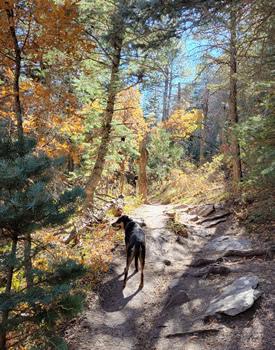 I’m still learning a lot. I just finished writing Blood Mountain, the second book in the series. I think what’s surprised me the most is how much more dangerous rural law enforcement jobs can be than urban ones. Game wardens are eight times as likely to be attacked on the job by suspects than are city cops. They’re out there by themselves, in areas without phone or radio service, without partners, up against armed poachers who don’t care about the law or life, who think anything goes as long as no one else knows about it. This is perilous. It really drove home the danger not only game wardens face, but also wildlife. Wildlife needs much more protection that it’s getting. In New Mexico alone, more than 40,000 deer are poached every year. That’s the same number, or higher, than the number legally allowed to conserve this species. Animals are our brothers, our sisters, and yet our species is so destructive, so hateful. The violence done by humans to the rest of the natural world is actually a form of self-destruction. I hope this book series can help people to understand what’s at stake if we don’t stop the exploitation of wildlife.
I’m still learning a lot. I just finished writing Blood Mountain, the second book in the series. I think what’s surprised me the most is how much more dangerous rural law enforcement jobs can be than urban ones. Game wardens are eight times as likely to be attacked on the job by suspects than are city cops. They’re out there by themselves, in areas without phone or radio service, without partners, up against armed poachers who don’t care about the law or life, who think anything goes as long as no one else knows about it. This is perilous. It really drove home the danger not only game wardens face, but also wildlife. Wildlife needs much more protection that it’s getting. In New Mexico alone, more than 40,000 deer are poached every year. That’s the same number, or higher, than the number legally allowed to conserve this species. Animals are our brothers, our sisters, and yet our species is so destructive, so hateful. The violence done by humans to the rest of the natural world is actually a form of self-destruction. I hope this book series can help people to understand what’s at stake if we don’t stop the exploitation of wildlife.
One of the (many) things that you execute so well is the action—there is a tremendous amount of it! What are some of the ways you go about crafting these action sequences? Are these easier or harder to write than some of the “quieter” moments?
Thank you for saying this. There’s a cliche about writing, that 99 percent of it is rewriting, and I think this is true. The outline is the exciting part, for a writer, when you’re discovering and experiencing the plot yourself. That’s the selfish, fun part. Then comes the giving, generous part, the part you do for the reader. As a writer of suspense, or any action-packed plot-driving story, you’re really leading your reader on a treasure hunt. You know the ending. You know where the treasure is. But the enjoyment the reader gets is in experiencing it all in real time, in their imagination.
To write fast-moving, page-turning suspense fiction actually takes an enormous amount of patience and emotional self-control. When my son was young, I used to hide gifts for him and leave him these trails of notes, for him to figure out how to find the treasure. Writing suspense feels a bit like this, in that the joy I derive from it is ultimately in providing an adventure for someone else. I believe people who write mystery or suspense tend to take pleasure in planning events, in facilitating the enjoyment of others.
HOLLOW BEASTS is the first in the Jodi Luna series. What can you share about the next installment? What do you hope readers see in her that compels them to read the next in the series?
In book two, Blood Mountain, I’ve explored the mystery genre a little more. This second book develops a bit more the relationships between and among the characters we met in HOLLOW BEASTS and explores the phenomenon of rural gentrification. Regardless of the plots for the Jodi Luna books, I hope that at the end of the day what compels readers to pick up the newest in the series is a connection to the people and places that are consistent from one book to the next. I like to create a world for readers to feel at home in, a place to belong. The plot for each book is just the vehicle, but the reason for getting in the car, so to speak, should hopefully be that the reader wants to hang out with the other people in it.
The book is set in New Mexico, and you do a great job of painting a picture of the landscape. Obviously this is not a new setting for books of this nature—was there something about the area you wanted readers to see from a different perspective? What drew you to that location?
I’m a native New Mexican. My family has been here for 11 generations that we can trace on paper, and many more, I suspect, that we can’t. I feel a deep rootedness to this place. I’ve lived in other places, and was away from New Mexico for 15 years, but I returned home to stay because no place else feels like this. I think there’s a lot that the rest of the United States could learn from New Mexico, about tolerance, about coexistence, about the long, diverse history of this nation, about the power of nature.
As with any good thriller, HOLLOW BEASTS is rife with a number of themes. Aside from a great read, what do you hope readers take away from this story?
Fairness and equality are important themes for me, as a person. So there are issues of fairness at every level of this book. Human ignorance and hatred are extremely dangerous, both to the wild places and things, and to humanity itself. Fear of The Other is a tragic, ugly thing, and leads to violent misunderstandings between groups of people as well as between humans and the animals they fear. If there’s one takeaway I hope people get from this book, it’s that ignorance is harmful to everyone, including those who allow it to make them cruel.
- On the Cover: Alisa Lynn Valdés - March 31, 2023
- On the Cover: Melissa Cassera - March 31, 2023
- Behind the Scenes: From Book to Netflix - March 31, 2023


